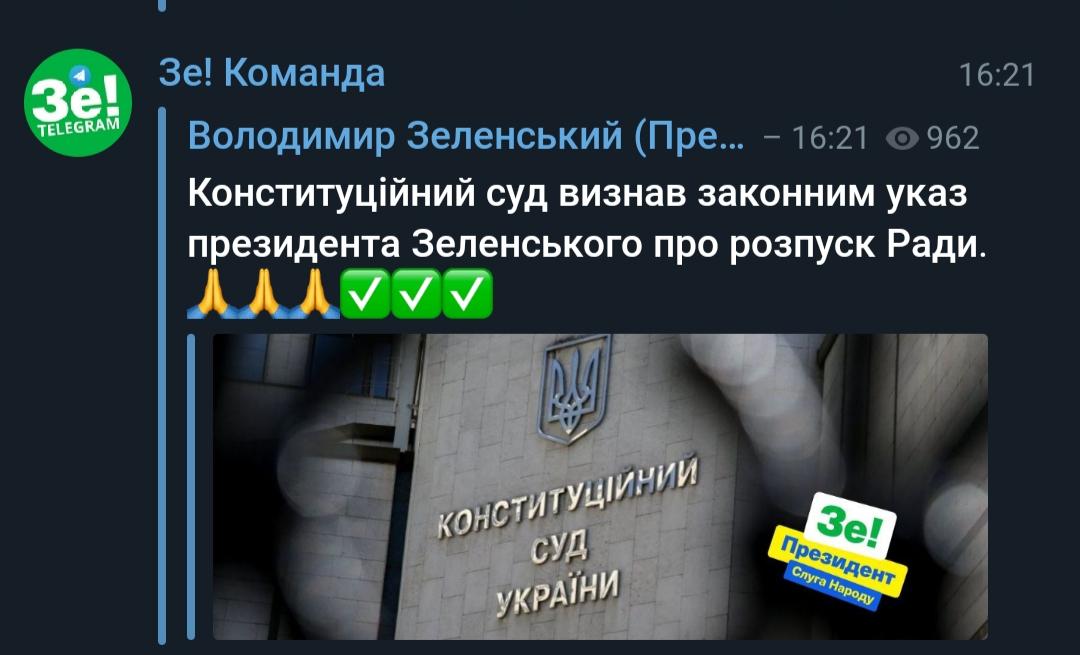Will Ukraine have snap 2019 parliamentary elections that will take place on 21 July? This question was in the air since 20 May when newly-elected president Volodymyr Zelenskyy announced the dissolution of the current parliament during his inauguration speech. On 23 May, the corresponding decree came into force. On 20 June, the question finally received an answer: yes, there will be snap elections on 21 July.
Zelenskyy justified his decision by high societal demand, but political experts explained it by the current popularity of the president’s Sluha Narody (Servant of the People) party. According to the recent polls, it is supported by some 50% of Ukrainians, far ahead of the rest of the parties.
The next day the decision on dissolving the parliament came into force, MPs from the Arseniy Yatseniuk’s Narodnyi Front (People’s Front) party filed an application to the Constitutional Court to recognize the decree as unconstitutional. 62 MPs signed the submission. Their main argument was that a coalition formally existed at the moment Zelenskyy disbanded the parliament, making it impossible for the president to dissolve the parliament by Ukrainian law.
The coalition of discord
According to the Ukrainian Constitution, there are three reasons to terminate the powers of the parliament:
- The parliament can’t form a coalition according to the Constitution during one month.
- During 60 days after the resignation of the Cabinet of Ministers, the government is not formed.
- During 30 days of one regular session, the parliament sessions can’t start.
The first one, the existence of the coalition, became an apple of discord in Ukrainian society.
“It’s a pity that discussions on whether the decree on dissolving the parliament was constitutional narrowed down to figuring out the formal fact of whether the coalition existed or not,” Serhiy Riznyk, Associate Professor of the Department of Constitutional Law of the Ivan Franko National University of Lviv, Chairman of the Constitutional Initiatives Center wrote
.
In particular, the next three issues became central:
- Whether the coalition ceases to exist when factions leave it;
- How legal is it for particular MPs to join the coalition and how to verify this;
- Whether the speaker of the Verkhovna Rada (Parliament) had announced that the coalition ceased to exist.
“The coalition is not the ultimate goal, but first of all a to form and support the government… In Ukraine, everything is the opposite. Somehow the coalition has almost turned into the central subject of the state policy,” the expert explains.
Riznyk says that the debates on whether the coalition exists are incorrect because the Constitution does not relate the president’s right to dissolve the parliament to the formal termination of the coalition.
Nevertheless, the coalition question became so heated that the Central Election Commission (CEC) had to join. On the eve of the Constitutional Court’s decision, Tetiana Slipachuk, the head of the CEC, speculated that the Court can’t stop the elections, but just recognize the decision as unconstitutional. She explained that the process of the preparation to the elections have already started.
“They can’t be postponed or paused temporarily for some period. Now we are at the final stage of the registration which ends on 20 June. After, we have five days to actually do the registration and to make the corresponding decision.”
The final decision
On Thursday afternoon 20 June, media were the first to inform on the decision of the Constitution Court
“The Court recognized the president’s decree on dissolving the parliament as constitutional,” wrote Ukrinform referring to its source in the court.
Zelenskyy’s team had said the same.
“Victory! Zelenskyy’s decree on dissolving the parliament was recognized as constitutional,” wrote Yuliya Mendel, spokesperson for the president, on her Facebook page, but later deleted the post. A similar message is still present on the Zelenskyy team’s telegram channel.

Closer to the evening, the final decision appeared on the site of the Court.
The text on the site explains that the conflict between the president and the parliament on the issue has no legal resolution because the Constitution does not describe the procedure of how the coalition ceases to exist. At the same time, it notes that the people are the “only carrier of sovereignty and the only source of power in Ukraine” and that their expression of will is implemented through elections. Thus, it prescribed that the constitutional conflict can be solved through holding elections.
Read also:
- What we know about the parties aiming for Ukraine’s next parliament
- How Zelenskyy’s party plans to win elections

